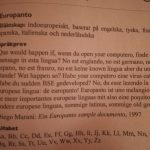I don’t even know. It’s from a book about languages my friend’s been reading. (it’s creepy that I can understand it …)
It was actually invented with that purpose: anyone who spoke any European language should be able to understand esperanto. It was meant to be a lingua franca.
STOP WHAT YOU’RE DOING Y’ALL AND TELL ME IF YOU UNDERSTAND THIS
I,understand about a half of it, I speak some dutch
“What Happened? Did your computer catch a virus? Did you suddenly develop BSE [mad cow disease]?”
Between German, English, Latin, a bit of French, Dutch, Spanish and Italian that was actually pretty readable to me.
I speak English and a very little spanish, and I can read it.
Super legible and I love it.
There are a few movies done partly or entirely in Esperanto, the most famous probably being Leslie Stevens’ Incubus (1966), a horror film starring William Shatner!
i grokked everything but a couple words that i could gather from context.
Hi folks! This is actually not Esperanto. It’s true that Esperanto draws words, syntax, etc. from other languages, but Esperanto would also be much less intelligible. Esperanto was constructed to be a consistent language that would be easy to learn. If you look at the description, this language is called Europanto.
(The way you can tell is that Esperanto has rules for how different parts of speech end: for instance, all the nouns end in -o. Also, Esperanto has a slightly different alphabet from English, and if you look at the alphabet for Europanto, it contains the same letters as the English alphabet.)
For instance, here is the first sentence of the first Harry Potter book in Esperanto:
Gesinjoroj Dursli ĉe numero kvar, Ligustra Vojo, fieris diri, ke ili estas “perfekte normalaj, multan dankon.”
As you can see, it doesn’t look like the passage in the original post, and it’s much more difficult to understand, unless you have the first sentence memorized, in which case it’s pretty simple. Some of the words, like ‘perfekte’ and ‘normalaj’, are similar to English, while others like ‘estas’ and ‘dankon’ are ones that English speakers can generally figure out with a vague knowledge of words in foreign languages. However, there isn’t nearly the same level of immediate comprehension in Esperanto that there is in Europanto.
That being said, both of these languages are super cool!
